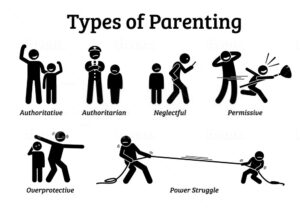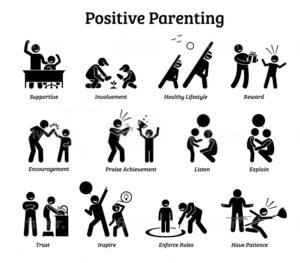Did you know, the environment your child grows up in can affect your child’s behavior invariably?
Parenting Style are based on how much emotional involvement, control, or warmth is shown to raise the child. There are 4 types of parenting styles: authoritarian, permissive, authoritative and uninvolved. These parenting styles are created by how parents handle their children’s behavior and discipline in the way they raise them.
Children’s’ physical and mental development over the years has long captivated developmental psychologists. It isn’t easy to detect direct cause-and-effect relationships between parent behaviors and children’s behavior. Some children who were raised in dramatically different environments grow up with remarkably similar personalities.
A kid that grows up in a house with one or more siblings or a similar environment can develop very different personalities. Although these challenges exist, after tedious hours of research, researchers have found that parenting styles and their effects on children are linked. These effects are also attributed to adult behavior, according to some.
Parent-child relationships are unique in every family. A child’s behavior, reaction, and thoughts will be influenced by how you parent and nourish them. It’s essential to define what type of parent you hope to be by considering the types of parenting you might consider.
Growth and development differ among children. One critical factor that affects a child’s development is how they are parented. Putting a focus on your parenting style and discipline can have a long-lasting impact on your child’s life. Researchers say this is important because your behavior towards them, and the discipline you impose, influence them throughout their lives.
Following hours of research on 100 pre-school goers using an observational approach, interviewing parents, and other approaches, child psychologist Diana Baumrind identified roughly 4 types of parenting styles. Communication styles, maturity expectations, and disciplinary initiatives qualify as part of these parenting style types.
According to the parenting style by Diana Baumrind, most parents follow one of the three types. Adding a fourth parenting style was recommended by fellow child psychologists Maccoby and Martin later in the study. Each of these influences a child’s behavior in a different way.
There is no definite type of parenting dignified as the best style of parenting. So, let’s have a look at the four types of parenting styles in psychology in detail.
4 Types of Parenting Styles :
Authoritative Parenting
Authoritarian parents set rules for their children that are expected to be followed by authoritative parenting styles. It is, however, a more democratic way of parenting.
So, what kind of parenting do authoritative parents provide?
Authoritative parents are attentive to their children and willing to listen to their questions. They expect a lot from their children, providing feedback, encouragement, and adequate support. Parental nurture and forgiveness rather than punishment are shown toward children when they fail to meet expectations.
In authoritative parenting, expectations and attentiveness are of the utmost importance. Rather than punishing their children, these parents are supportive rather than punitive. Their kids should be assertive, as well as socially responsible, and self-regulated as well as cooperative, according to Baumrind. Children of authoritative parents tend to gradually gain independence, self-control, and self-regulation skills by combining expectation with support.
Pros and Cons of authoritative parenting
A child’s responsibility for his/her decisions is reflected more in their personalities when they have authoritative parents who empower them. Peer pressure is rarely an issue for these children. Since they can make their own decisions, these children have inherent confidence and savvy that makes it easy to succeed in leadership roles. They develop resilience, or the ability to overcome and recover from life’s challenges and traumas. In addition to increasing self-esteem, this technique also increases confidence.
In the world of psychology, authoritative parenting is regarded as the most successful parenting style. Often in life, it is finding a balance between two options that will resolve a problem, and this can certainly be applied here as well. The typical teenage experience includes phases of defiance, displeasure, and apathy. These phases are particularly difficult for authoritative parents, who are naturally concerned about raising their children well.
Authoritarian Parenting
Being authoritative and being authoritarian is slightly different; how?
Children following strict rules established by their parents become victims of this type of parenting style. Usually, the consequences of not following these rules are severe. It is uncommon for authoritative parents to explain their rules. Parents might simply state that their children ought to obey since they said so when asked to explain.
Parents with high expectations usually don’t pay very close attention to their children. Children are expected to behave exceptionally well and not make mistakes, yet parents provide very little guidance about what their children should and shouldn’t do. It’s quite common for parents to punish their children for making mistakes, often harshly, leaving their children wondering what happened.
Parental orders are expected to be obeyed without explanation by these parents who emphasize obedience and status. Their domineering and dictatorial behaviour often makes them a target for criticism. Children reeling under such style often tend to lack a strong connection with their parents and tend to abstain from sharing bits of their personal life, and in turn, hides them from their parents.
Pros and Cons of authoritarian parenting
The most well-behaved kids are often those who have grown up with authoritarian parents. The rules are crystal clear with such a parenting style, and they know stepping out of line will lead to trouble. As a result, children become capable of knowing what is and isn’t appropriate.
Also, they will avoid stepping out of line because they are highly aware of the negative consequences of misbehaving. Parenting techniques used by authoritarians include detailed instructions for bringing up children. The children can learn the steps to accomplish a goal by using this structure.
In contrast, numerous studies have shown that this parenting style can cause kids to suffer from depression and anxiety. A system of institution and rules of parenting based on conformity is exhibited in authoritarian parenting.
When children find themselves exposed to situations without established guidelines, they often feel insecure and unsure how to act. These children eventually grow tired of being bombarded with an ever-expanding list of rules. Therefore, they will purposely challenge their parents’ limits, which may endanger their lives.
Permissive Parenting
Children of permissive parents, sometimes known as indulgent parents, have very few demands placed upon them. Due to their relatively low expectations of maturity and self-control, these parents rarely discipline their children.
Baumrind argues that permissive parents are more receptive than demanding. Their lenient nature, lack of demanding behavior, freedom of self-regulation, and confrontation avoidance make them nontraditional. A permissive parent will often take the role of a friend instead of a parent when communicating with their children. Permissive parenting is characterized by an exhibition of care and the absence of stringent boundaries imposed on the kids.
However, kids exposed to this style of parenting, being devoid of negative punishment, often have an affinity towards aggression, lack self-control, and are often spoiled, which hinders their personality growth in the future.
Pros and Cons of permissive parenting
Parents and children are equally able to communicate in this parenting technique, and children do not feel intimidated when expressing themselves. Children’s self-esteem may be higher than that of other children since they know their parents will love them no matter what. Since parents work around their children’s needs and want, conflicts are minimized.
The parents react to their children’s behavior rather than imposing sanctions in advance, so kids may not have any sense of boundaries.
Studies have found that this type of parenting technique may incline kids to behave riskily in the future, particularly concerning alcohol use. Since children rarely defer to their parents or treat them with more respect, they tend not to understand respect. The issues can be especially challenging in work, school, and other social contexts.
Uninvolved Parenting
Psychologists Eleanor Maccoby and John Martin offered a fourth parenting style and the three major styles introduced by Baumrind. Parents who practice uninvolved parenting tend to make fewer demands, are less responsive, and communicate less than the ideas exhibited in the previously mentioned three parenting styles types.
Parents like these usually fulfill their child’s basic needs without being actively involved. Often, parents provide shelter and food for their kids but provide little guidance, structure, or rules. Parents who reject or neglect their children’s needs may even reject their children in the extreme.
The parents being distant from the kids in terms of daily activities or anything going on in their lives in general, the offspring share an impulsive relationship with them. They tend to perform poorly in academics; they begin to have problems with their self-esteem- all of which increases their chances of getting sabotaged by mental disorders and illness in the future.
Pros and Cons of uninvolved parenting
Unlike other children, children in an uninvolved parenting setup have difficulty competing. Depression can result from feeling abandoned. When a child feels like their parents do not want them, they lose confidence in themselves. The problem is that they cannot articulate their feelings, which makes it hard for them to stick to relationships.
Parents who aren’t involved in their children’s lives result in unloved children. Children suffer severe psychological consequences due to the lack of a role model. Since there’s no role model, they are often in knots trying to find the right path. The child often feels completely disillusioned and sometimes seeks others’ advice for making decisions. Having no such understanding of boundaries leads to the child becoming more and more introverted.
Every parent wants what’s best for their child; but even more than that they want what’s best for themselves.
What Parenting Style is associated with Child Aggression?
Children’s health and character development are significantly influenced by their parenting styles. Children, as a matter of fact, feel less or more confident about themselves depending on how you treat your children as parents. It is, therefore, crucial that you act properly as a parent so that your child’s general health and personal development are not negatively impacted. If you are a parent, you should be aware of the fact that your children will be shaped by your parenting style for the rest of their lives.
The impact of a parenting style depends largely on the character of the child, as well as the parenting style, particularly when it comes to child aggression. It is possible that children who are uninvolved and lenient or who are too strict may behave aggressively. Selecting an appropriate parenting style for your child is crucial to avoid issues like child aggression. So it is worthwhile to say that the parenting style of all parents tends to develop aggression in their children.
Authoritative Parenting Style may Lead to Aggression in Children
Different factors influence a child’s growth and development based on how you raise your children, how you treat them in their childhood, and how authoritative you are with your parenting. Child psychologists believe that there is a higher likelihood of aggression in children with authoritative parents. They are more aggressive and hostile during difficult times in their lives because they have been suppressed their entire lives.
Giving children a space to formulate their opinion and express their opinion confidently can help reduce child aggression to a certain extent. It has been noted that the parents who follow the parenting styles recommended by psychologists tend to raise emotionally stable, responsible children, while parents who follow other parenting styles tend to raise children who are immature and emotionally unstable.




